Nursing Care for Alzheimer's: A Placement Case Study Analysis
VerifiedAdded on 2023/02/01
|8
|3227
|84
Case Study
AI Summary
This case study details the nursing care of a 90-year-old female patient, X, diagnosed with Alzheimer's disease, focusing on person-centred care and the management of challenging behaviours. The assessment includes a comprehensive mental status examination revealing aggression and apathy. The essay discusses the importance of addressing these behaviours through understanding triggers, supporting patient needs, and implementing non-pharmacological interventions. The care plan emphasizes establishing therapeutic relationships, incorporating cultural safety principles, and applying Nursing Council of New Zealand competencies. The study highlights strategies to prevent aggression, address apathy, and promote patient well-being through tailored interventions such as therapeutic observation and activity engagement. The essay also reflects on the application of nursing competencies 3.1 and 3.2, emphasizing therapeutic communication, respect, and patient involvement in care decisions, ultimately aiming to enhance the patient's quality of life.

UNIT:
DATE:
NAME:
DATE:
NAME:
Paraphrase This Document
Need a fresh take? Get an instant paraphrase of this document with our AI Paraphraser
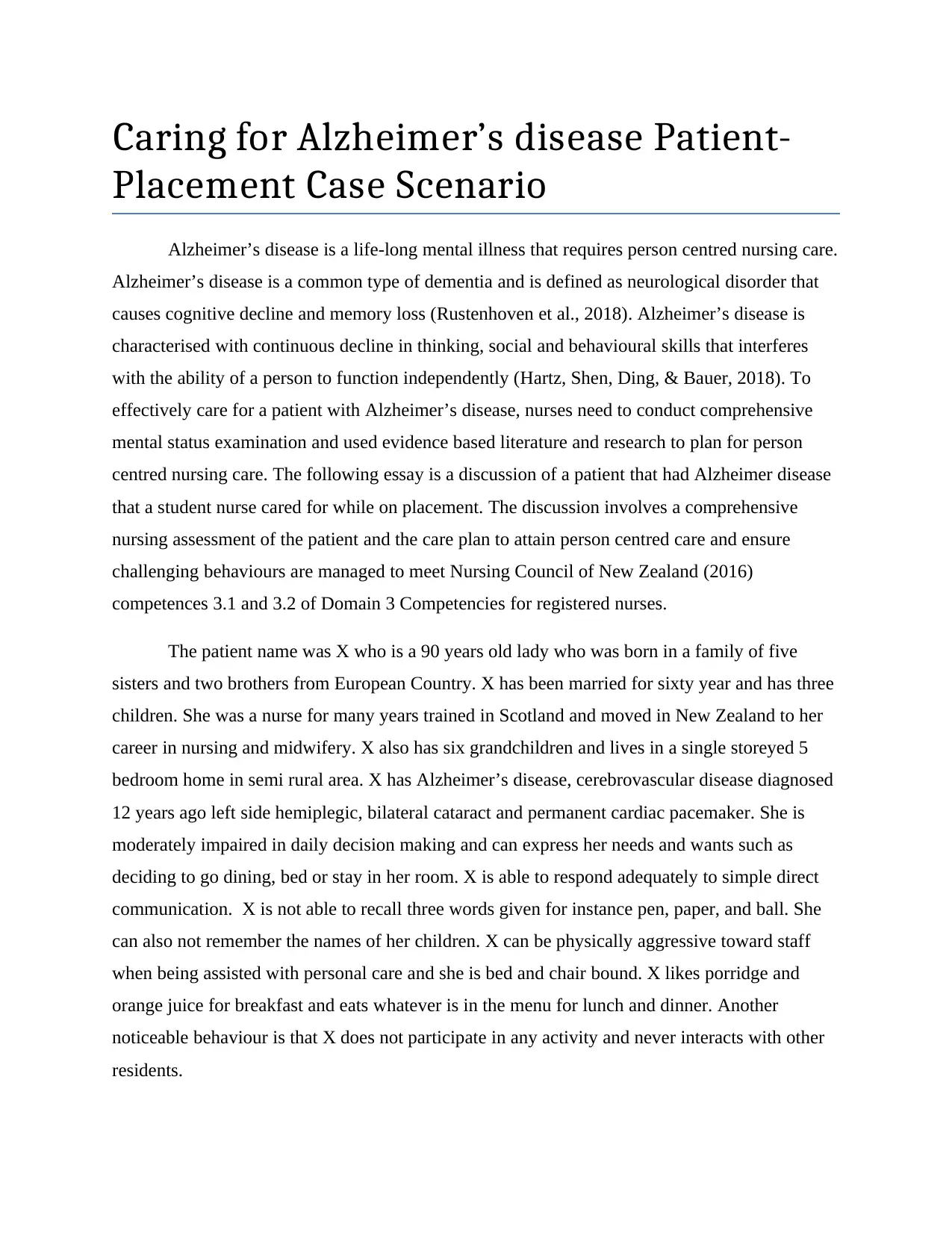
Caring for Alzheimer’s disease Patient-
Placement Case Scenario
Alzheimer’s disease is a life-long mental illness that requires person centred nursing care.
Alzheimer’s disease is a common type of dementia and is defined as neurological disorder that
causes cognitive decline and memory loss (Rustenhoven et al., 2018). Alzheimer’s disease is
characterised with continuous decline in thinking, social and behavioural skills that interferes
with the ability of a person to function independently (Hartz, Shen, Ding, & Bauer, 2018). To
effectively care for a patient with Alzheimer’s disease, nurses need to conduct comprehensive
mental status examination and used evidence based literature and research to plan for person
centred nursing care. The following essay is a discussion of a patient that had Alzheimer disease
that a student nurse cared for while on placement. The discussion involves a comprehensive
nursing assessment of the patient and the care plan to attain person centred care and ensure
challenging behaviours are managed to meet Nursing Council of New Zealand (2016)
competences 3.1 and 3.2 of Domain 3 Competencies for registered nurses.
The patient name was X who is a 90 years old lady who was born in a family of five
sisters and two brothers from European Country. X has been married for sixty year and has three
children. She was a nurse for many years trained in Scotland and moved in New Zealand to her
career in nursing and midwifery. X also has six grandchildren and lives in a single storeyed 5
bedroom home in semi rural area. X has Alzheimer’s disease, cerebrovascular disease diagnosed
12 years ago left side hemiplegic, bilateral cataract and permanent cardiac pacemaker. She is
moderately impaired in daily decision making and can express her needs and wants such as
deciding to go dining, bed or stay in her room. X is able to respond adequately to simple direct
communication. X is not able to recall three words given for instance pen, paper, and ball. She
can also not remember the names of her children. X can be physically aggressive toward staff
when being assisted with personal care and she is bed and chair bound. X likes porridge and
orange juice for breakfast and eats whatever is in the menu for lunch and dinner. Another
noticeable behaviour is that X does not participate in any activity and never interacts with other
residents.
Placement Case Scenario
Alzheimer’s disease is a life-long mental illness that requires person centred nursing care.
Alzheimer’s disease is a common type of dementia and is defined as neurological disorder that
causes cognitive decline and memory loss (Rustenhoven et al., 2018). Alzheimer’s disease is
characterised with continuous decline in thinking, social and behavioural skills that interferes
with the ability of a person to function independently (Hartz, Shen, Ding, & Bauer, 2018). To
effectively care for a patient with Alzheimer’s disease, nurses need to conduct comprehensive
mental status examination and used evidence based literature and research to plan for person
centred nursing care. The following essay is a discussion of a patient that had Alzheimer disease
that a student nurse cared for while on placement. The discussion involves a comprehensive
nursing assessment of the patient and the care plan to attain person centred care and ensure
challenging behaviours are managed to meet Nursing Council of New Zealand (2016)
competences 3.1 and 3.2 of Domain 3 Competencies for registered nurses.
The patient name was X who is a 90 years old lady who was born in a family of five
sisters and two brothers from European Country. X has been married for sixty year and has three
children. She was a nurse for many years trained in Scotland and moved in New Zealand to her
career in nursing and midwifery. X also has six grandchildren and lives in a single storeyed 5
bedroom home in semi rural area. X has Alzheimer’s disease, cerebrovascular disease diagnosed
12 years ago left side hemiplegic, bilateral cataract and permanent cardiac pacemaker. She is
moderately impaired in daily decision making and can express her needs and wants such as
deciding to go dining, bed or stay in her room. X is able to respond adequately to simple direct
communication. X is not able to recall three words given for instance pen, paper, and ball. She
can also not remember the names of her children. X can be physically aggressive toward staff
when being assisted with personal care and she is bed and chair bound. X likes porridge and
orange juice for breakfast and eats whatever is in the menu for lunch and dinner. Another
noticeable behaviour is that X does not participate in any activity and never interacts with other
residents.
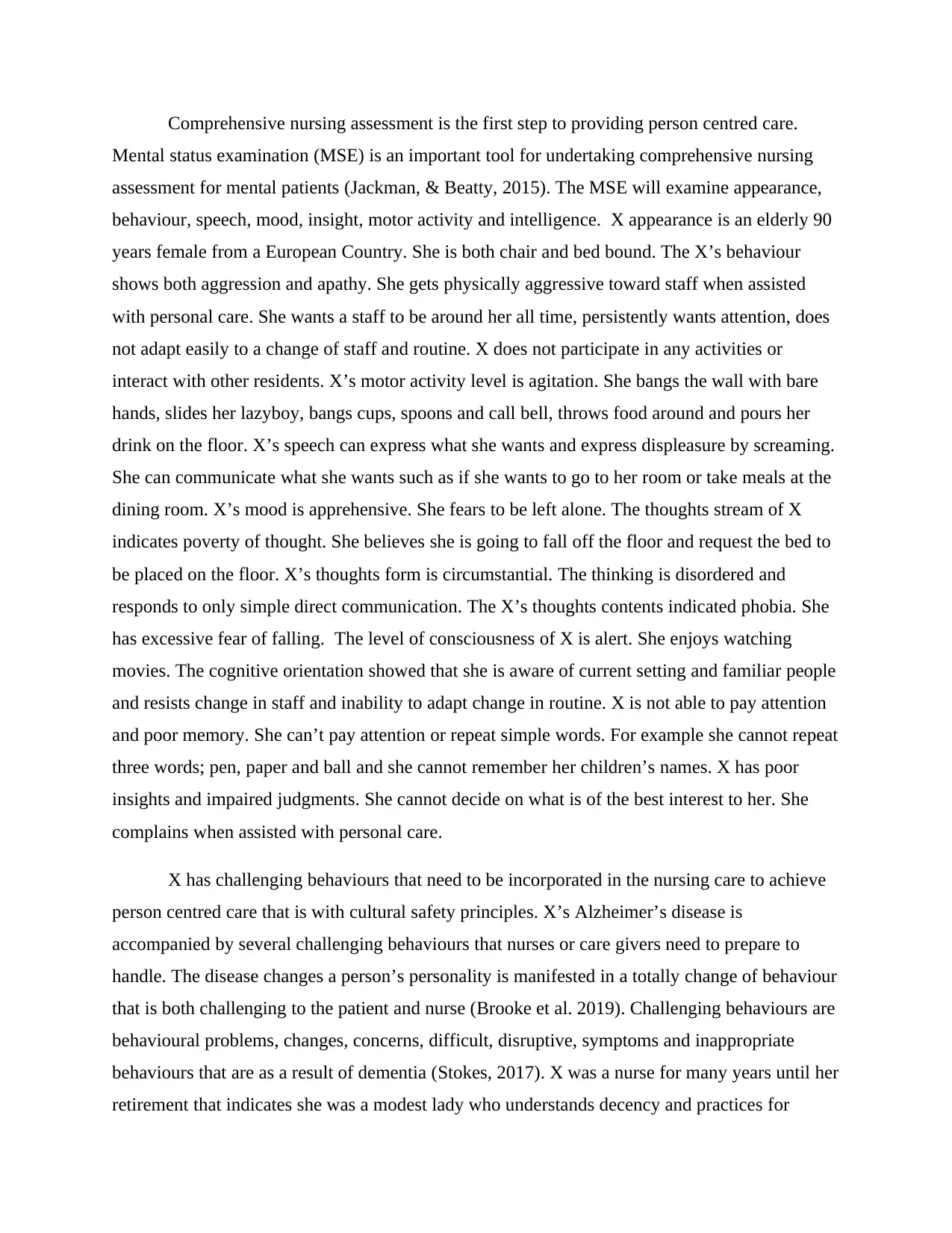
Comprehensive nursing assessment is the first step to providing person centred care.
Mental status examination (MSE) is an important tool for undertaking comprehensive nursing
assessment for mental patients (Jackman, & Beatty, 2015). The MSE will examine appearance,
behaviour, speech, mood, insight, motor activity and intelligence. X appearance is an elderly 90
years female from a European Country. She is both chair and bed bound. The X’s behaviour
shows both aggression and apathy. She gets physically aggressive toward staff when assisted
with personal care. She wants a staff to be around her all time, persistently wants attention, does
not adapt easily to a change of staff and routine. X does not participate in any activities or
interact with other residents. X’s motor activity level is agitation. She bangs the wall with bare
hands, slides her lazyboy, bangs cups, spoons and call bell, throws food around and pours her
drink on the floor. X’s speech can express what she wants and express displeasure by screaming.
She can communicate what she wants such as if she wants to go to her room or take meals at the
dining room. X’s mood is apprehensive. She fears to be left alone. The thoughts stream of X
indicates poverty of thought. She believes she is going to fall off the floor and request the bed to
be placed on the floor. X’s thoughts form is circumstantial. The thinking is disordered and
responds to only simple direct communication. The X’s thoughts contents indicated phobia. She
has excessive fear of falling. The level of consciousness of X is alert. She enjoys watching
movies. The cognitive orientation showed that she is aware of current setting and familiar people
and resists change in staff and inability to adapt change in routine. X is not able to pay attention
and poor memory. She can’t pay attention or repeat simple words. For example she cannot repeat
three words; pen, paper and ball and she cannot remember her children’s names. X has poor
insights and impaired judgments. She cannot decide on what is of the best interest to her. She
complains when assisted with personal care.
X has challenging behaviours that need to be incorporated in the nursing care to achieve
person centred care that is with cultural safety principles. X’s Alzheimer’s disease is
accompanied by several challenging behaviours that nurses or care givers need to prepare to
handle. The disease changes a person’s personality is manifested in a totally change of behaviour
that is both challenging to the patient and nurse (Brooke et al. 2019). Challenging behaviours are
behavioural problems, changes, concerns, difficult, disruptive, symptoms and inappropriate
behaviours that are as a result of dementia (Stokes, 2017). X was a nurse for many years until her
retirement that indicates she was a modest lady who understands decency and practices for
Mental status examination (MSE) is an important tool for undertaking comprehensive nursing
assessment for mental patients (Jackman, & Beatty, 2015). The MSE will examine appearance,
behaviour, speech, mood, insight, motor activity and intelligence. X appearance is an elderly 90
years female from a European Country. She is both chair and bed bound. The X’s behaviour
shows both aggression and apathy. She gets physically aggressive toward staff when assisted
with personal care. She wants a staff to be around her all time, persistently wants attention, does
not adapt easily to a change of staff and routine. X does not participate in any activities or
interact with other residents. X’s motor activity level is agitation. She bangs the wall with bare
hands, slides her lazyboy, bangs cups, spoons and call bell, throws food around and pours her
drink on the floor. X’s speech can express what she wants and express displeasure by screaming.
She can communicate what she wants such as if she wants to go to her room or take meals at the
dining room. X’s mood is apprehensive. She fears to be left alone. The thoughts stream of X
indicates poverty of thought. She believes she is going to fall off the floor and request the bed to
be placed on the floor. X’s thoughts form is circumstantial. The thinking is disordered and
responds to only simple direct communication. The X’s thoughts contents indicated phobia. She
has excessive fear of falling. The level of consciousness of X is alert. She enjoys watching
movies. The cognitive orientation showed that she is aware of current setting and familiar people
and resists change in staff and inability to adapt change in routine. X is not able to pay attention
and poor memory. She can’t pay attention or repeat simple words. For example she cannot repeat
three words; pen, paper and ball and she cannot remember her children’s names. X has poor
insights and impaired judgments. She cannot decide on what is of the best interest to her. She
complains when assisted with personal care.
X has challenging behaviours that need to be incorporated in the nursing care to achieve
person centred care that is with cultural safety principles. X’s Alzheimer’s disease is
accompanied by several challenging behaviours that nurses or care givers need to prepare to
handle. The disease changes a person’s personality is manifested in a totally change of behaviour
that is both challenging to the patient and nurse (Brooke et al. 2019). Challenging behaviours are
behavioural problems, changes, concerns, difficult, disruptive, symptoms and inappropriate
behaviours that are as a result of dementia (Stokes, 2017). X was a nurse for many years until her
retirement that indicates she was a modest lady who understands decency and practices for
⊘ This is a preview!⊘
Do you want full access?
Subscribe today to unlock all pages.

Trusted by 1+ million students worldwide
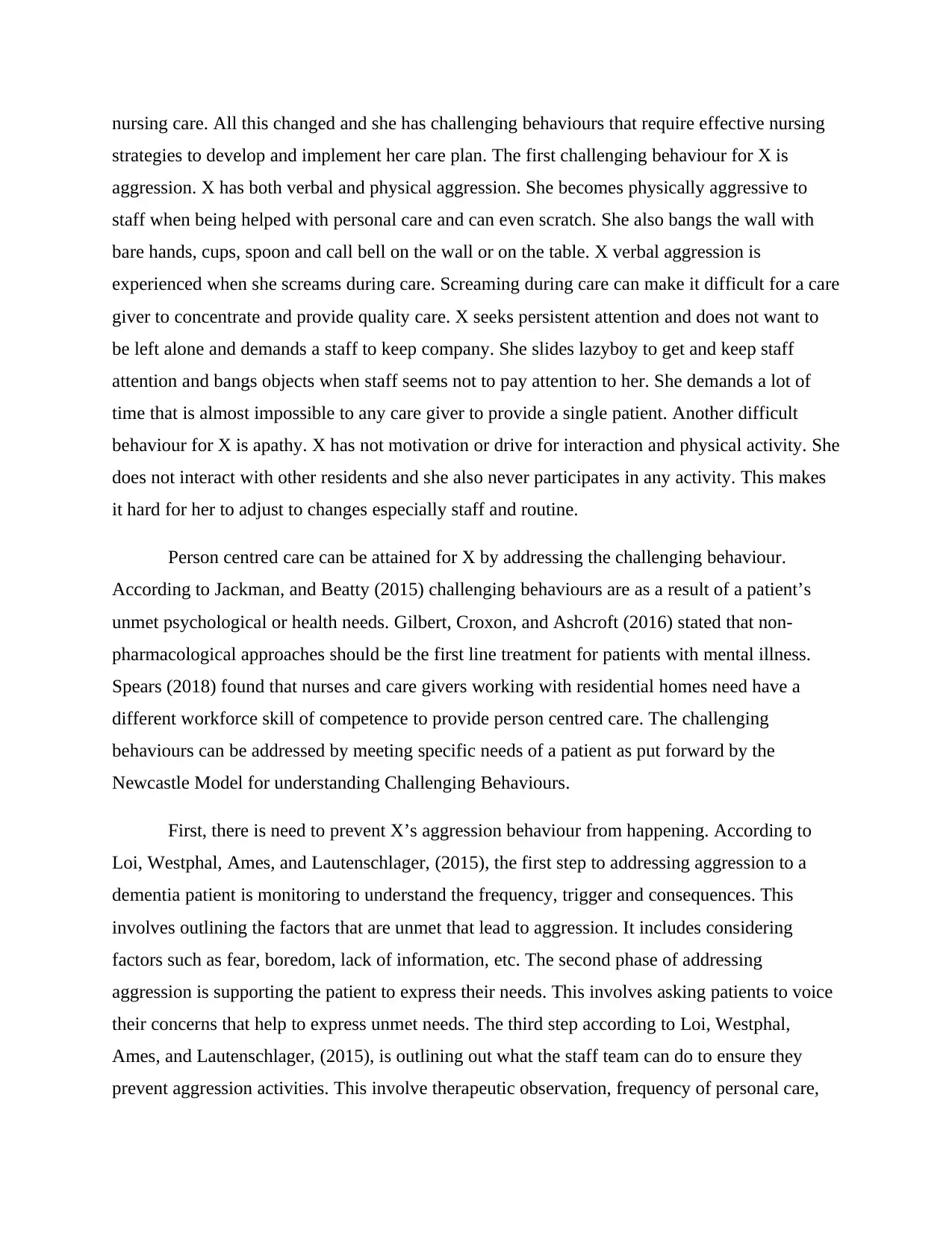
nursing care. All this changed and she has challenging behaviours that require effective nursing
strategies to develop and implement her care plan. The first challenging behaviour for X is
aggression. X has both verbal and physical aggression. She becomes physically aggressive to
staff when being helped with personal care and can even scratch. She also bangs the wall with
bare hands, cups, spoon and call bell on the wall or on the table. X verbal aggression is
experienced when she screams during care. Screaming during care can make it difficult for a care
giver to concentrate and provide quality care. X seeks persistent attention and does not want to
be left alone and demands a staff to keep company. She slides lazyboy to get and keep staff
attention and bangs objects when staff seems not to pay attention to her. She demands a lot of
time that is almost impossible to any care giver to provide a single patient. Another difficult
behaviour for X is apathy. X has not motivation or drive for interaction and physical activity. She
does not interact with other residents and she also never participates in any activity. This makes
it hard for her to adjust to changes especially staff and routine.
Person centred care can be attained for X by addressing the challenging behaviour.
According to Jackman, and Beatty (2015) challenging behaviours are as a result of a patient’s
unmet psychological or health needs. Gilbert, Croxon, and Ashcroft (2016) stated that non-
pharmacological approaches should be the first line treatment for patients with mental illness.
Spears (2018) found that nurses and care givers working with residential homes need have a
different workforce skill of competence to provide person centred care. The challenging
behaviours can be addressed by meeting specific needs of a patient as put forward by the
Newcastle Model for understanding Challenging Behaviours.
First, there is need to prevent X’s aggression behaviour from happening. According to
Loi, Westphal, Ames, and Lautenschlager, (2015), the first step to addressing aggression to a
dementia patient is monitoring to understand the frequency, trigger and consequences. This
involves outlining the factors that are unmet that lead to aggression. It includes considering
factors such as fear, boredom, lack of information, etc. The second phase of addressing
aggression is supporting the patient to express their needs. This involves asking patients to voice
their concerns that help to express unmet needs. The third step according to Loi, Westphal,
Ames, and Lautenschlager, (2015), is outlining out what the staff team can do to ensure they
prevent aggression activities. This involve therapeutic observation, frequency of personal care,
strategies to develop and implement her care plan. The first challenging behaviour for X is
aggression. X has both verbal and physical aggression. She becomes physically aggressive to
staff when being helped with personal care and can even scratch. She also bangs the wall with
bare hands, cups, spoon and call bell on the wall or on the table. X verbal aggression is
experienced when she screams during care. Screaming during care can make it difficult for a care
giver to concentrate and provide quality care. X seeks persistent attention and does not want to
be left alone and demands a staff to keep company. She slides lazyboy to get and keep staff
attention and bangs objects when staff seems not to pay attention to her. She demands a lot of
time that is almost impossible to any care giver to provide a single patient. Another difficult
behaviour for X is apathy. X has not motivation or drive for interaction and physical activity. She
does not interact with other residents and she also never participates in any activity. This makes
it hard for her to adjust to changes especially staff and routine.
Person centred care can be attained for X by addressing the challenging behaviour.
According to Jackman, and Beatty (2015) challenging behaviours are as a result of a patient’s
unmet psychological or health needs. Gilbert, Croxon, and Ashcroft (2016) stated that non-
pharmacological approaches should be the first line treatment for patients with mental illness.
Spears (2018) found that nurses and care givers working with residential homes need have a
different workforce skill of competence to provide person centred care. The challenging
behaviours can be addressed by meeting specific needs of a patient as put forward by the
Newcastle Model for understanding Challenging Behaviours.
First, there is need to prevent X’s aggression behaviour from happening. According to
Loi, Westphal, Ames, and Lautenschlager, (2015), the first step to addressing aggression to a
dementia patient is monitoring to understand the frequency, trigger and consequences. This
involves outlining the factors that are unmet that lead to aggression. It includes considering
factors such as fear, boredom, lack of information, etc. The second phase of addressing
aggression is supporting the patient to express their needs. This involves asking patients to voice
their concerns that help to express unmet needs. The third step according to Loi, Westphal,
Ames, and Lautenschlager, (2015), is outlining out what the staff team can do to ensure they
prevent aggression activities. This involve therapeutic observation, frequency of personal care,
Paraphrase This Document
Need a fresh take? Get an instant paraphrase of this document with our AI Paraphraser
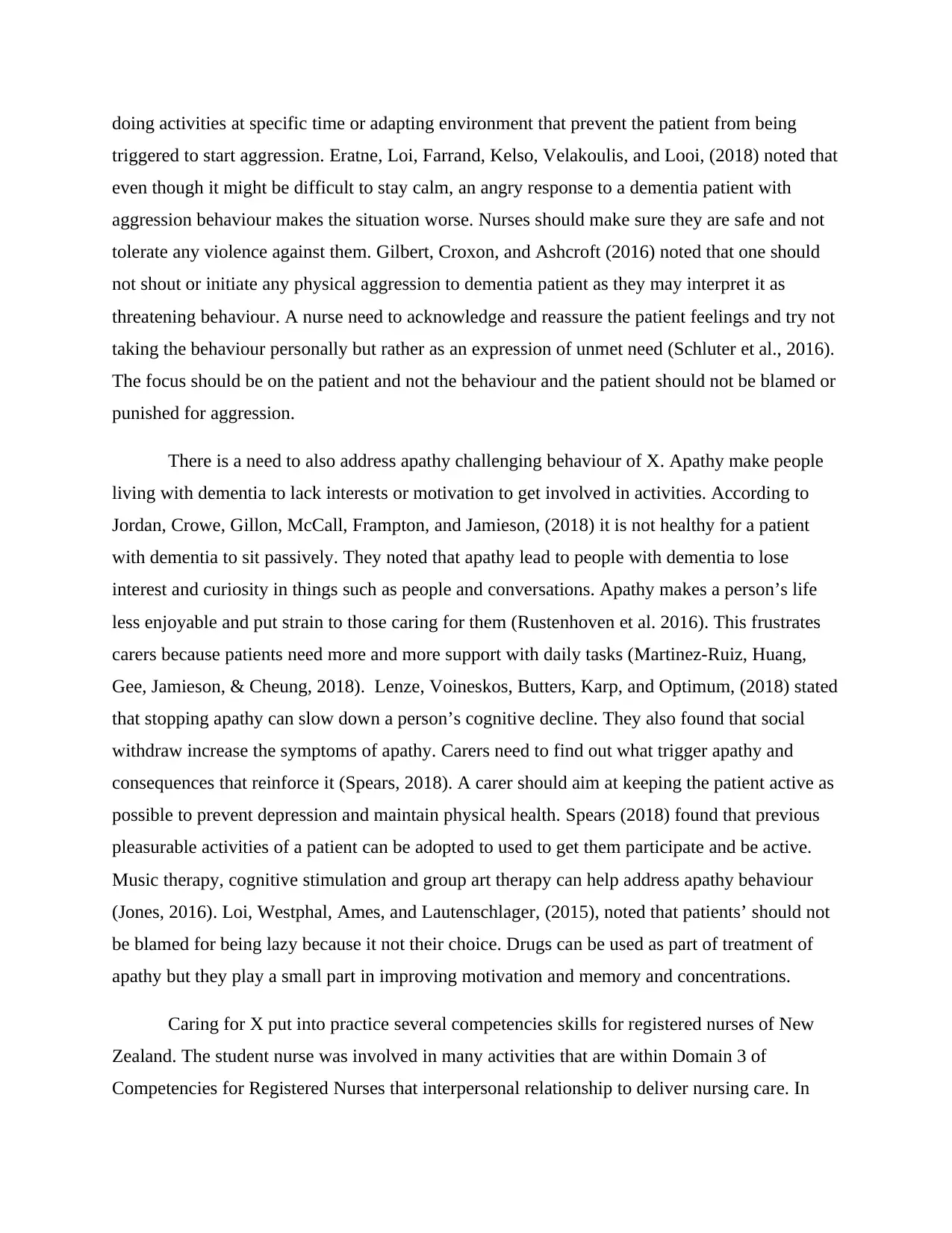
doing activities at specific time or adapting environment that prevent the patient from being
triggered to start aggression. Eratne, Loi, Farrand, Kelso, Velakoulis, and Looi, (2018) noted that
even though it might be difficult to stay calm, an angry response to a dementia patient with
aggression behaviour makes the situation worse. Nurses should make sure they are safe and not
tolerate any violence against them. Gilbert, Croxon, and Ashcroft (2016) noted that one should
not shout or initiate any physical aggression to dementia patient as they may interpret it as
threatening behaviour. A nurse need to acknowledge and reassure the patient feelings and try not
taking the behaviour personally but rather as an expression of unmet need (Schluter et al., 2016).
The focus should be on the patient and not the behaviour and the patient should not be blamed or
punished for aggression.
There is a need to also address apathy challenging behaviour of X. Apathy make people
living with dementia to lack interests or motivation to get involved in activities. According to
Jordan, Crowe, Gillon, McCall, Frampton, and Jamieson, (2018) it is not healthy for a patient
with dementia to sit passively. They noted that apathy lead to people with dementia to lose
interest and curiosity in things such as people and conversations. Apathy makes a person’s life
less enjoyable and put strain to those caring for them (Rustenhoven et al. 2016). This frustrates
carers because patients need more and more support with daily tasks (Martinez-Ruiz, Huang,
Gee, Jamieson, & Cheung, 2018). Lenze, Voineskos, Butters, Karp, and Optimum, (2018) stated
that stopping apathy can slow down a person’s cognitive decline. They also found that social
withdraw increase the symptoms of apathy. Carers need to find out what trigger apathy and
consequences that reinforce it (Spears, 2018). A carer should aim at keeping the patient active as
possible to prevent depression and maintain physical health. Spears (2018) found that previous
pleasurable activities of a patient can be adopted to used to get them participate and be active.
Music therapy, cognitive stimulation and group art therapy can help address apathy behaviour
(Jones, 2016). Loi, Westphal, Ames, and Lautenschlager, (2015), noted that patients’ should not
be blamed for being lazy because it not their choice. Drugs can be used as part of treatment of
apathy but they play a small part in improving motivation and memory and concentrations.
Caring for X put into practice several competencies skills for registered nurses of New
Zealand. The student nurse was involved in many activities that are within Domain 3 of
Competencies for Registered Nurses that interpersonal relationship to deliver nursing care. In
triggered to start aggression. Eratne, Loi, Farrand, Kelso, Velakoulis, and Looi, (2018) noted that
even though it might be difficult to stay calm, an angry response to a dementia patient with
aggression behaviour makes the situation worse. Nurses should make sure they are safe and not
tolerate any violence against them. Gilbert, Croxon, and Ashcroft (2016) noted that one should
not shout or initiate any physical aggression to dementia patient as they may interpret it as
threatening behaviour. A nurse need to acknowledge and reassure the patient feelings and try not
taking the behaviour personally but rather as an expression of unmet need (Schluter et al., 2016).
The focus should be on the patient and not the behaviour and the patient should not be blamed or
punished for aggression.
There is a need to also address apathy challenging behaviour of X. Apathy make people
living with dementia to lack interests or motivation to get involved in activities. According to
Jordan, Crowe, Gillon, McCall, Frampton, and Jamieson, (2018) it is not healthy for a patient
with dementia to sit passively. They noted that apathy lead to people with dementia to lose
interest and curiosity in things such as people and conversations. Apathy makes a person’s life
less enjoyable and put strain to those caring for them (Rustenhoven et al. 2016). This frustrates
carers because patients need more and more support with daily tasks (Martinez-Ruiz, Huang,
Gee, Jamieson, & Cheung, 2018). Lenze, Voineskos, Butters, Karp, and Optimum, (2018) stated
that stopping apathy can slow down a person’s cognitive decline. They also found that social
withdraw increase the symptoms of apathy. Carers need to find out what trigger apathy and
consequences that reinforce it (Spears, 2018). A carer should aim at keeping the patient active as
possible to prevent depression and maintain physical health. Spears (2018) found that previous
pleasurable activities of a patient can be adopted to used to get them participate and be active.
Music therapy, cognitive stimulation and group art therapy can help address apathy behaviour
(Jones, 2016). Loi, Westphal, Ames, and Lautenschlager, (2015), noted that patients’ should not
be blamed for being lazy because it not their choice. Drugs can be used as part of treatment of
apathy but they play a small part in improving motivation and memory and concentrations.
Caring for X put into practice several competencies skills for registered nurses of New
Zealand. The student nurse was involved in many activities that are within Domain 3 of
Competencies for Registered Nurses that interpersonal relationship to deliver nursing care. In
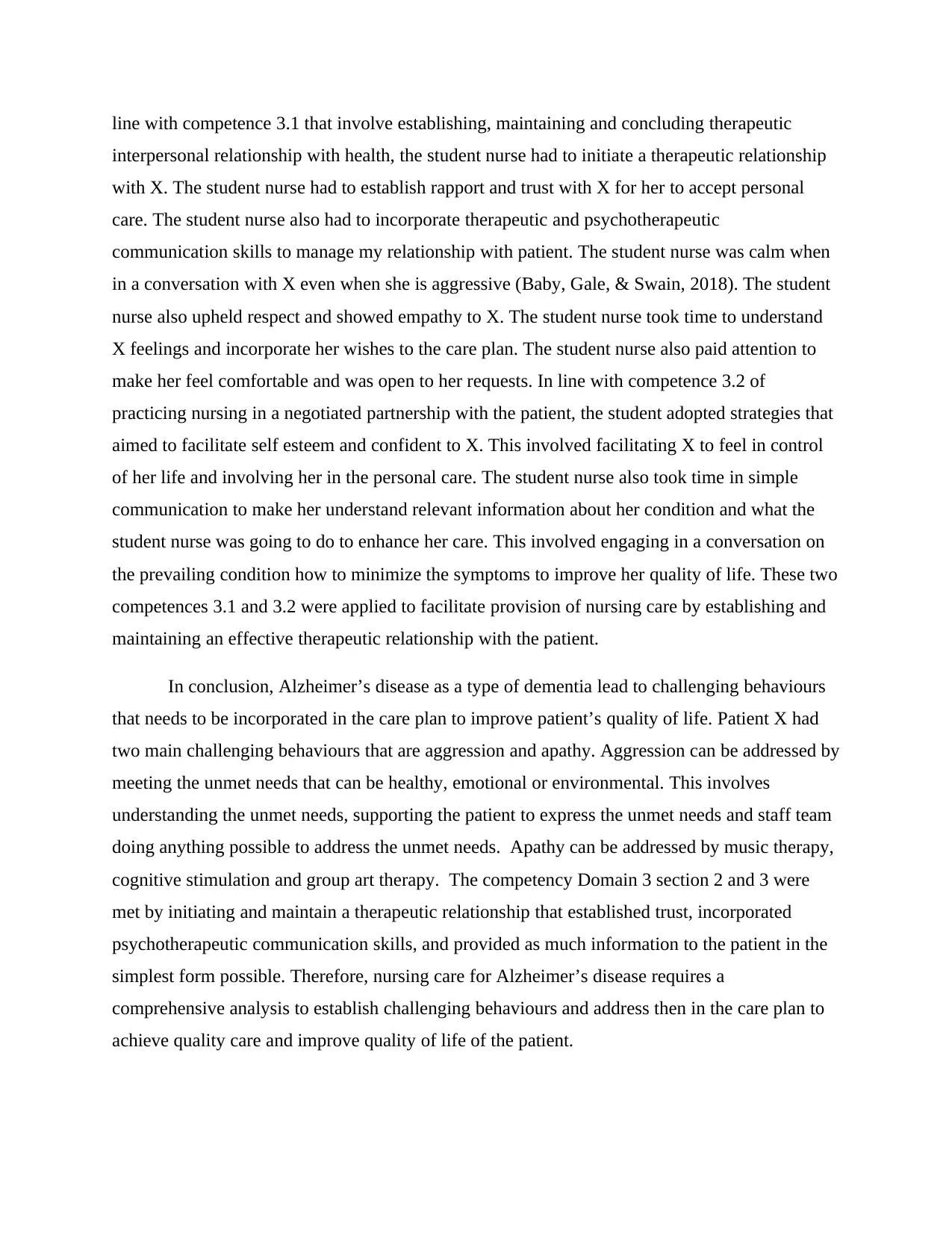
line with competence 3.1 that involve establishing, maintaining and concluding therapeutic
interpersonal relationship with health, the student nurse had to initiate a therapeutic relationship
with X. The student nurse had to establish rapport and trust with X for her to accept personal
care. The student nurse also had to incorporate therapeutic and psychotherapeutic
communication skills to manage my relationship with patient. The student nurse was calm when
in a conversation with X even when she is aggressive (Baby, Gale, & Swain, 2018). The student
nurse also upheld respect and showed empathy to X. The student nurse took time to understand
X feelings and incorporate her wishes to the care plan. The student nurse also paid attention to
make her feel comfortable and was open to her requests. In line with competence 3.2 of
practicing nursing in a negotiated partnership with the patient, the student adopted strategies that
aimed to facilitate self esteem and confident to X. This involved facilitating X to feel in control
of her life and involving her in the personal care. The student nurse also took time in simple
communication to make her understand relevant information about her condition and what the
student nurse was going to do to enhance her care. This involved engaging in a conversation on
the prevailing condition how to minimize the symptoms to improve her quality of life. These two
competences 3.1 and 3.2 were applied to facilitate provision of nursing care by establishing and
maintaining an effective therapeutic relationship with the patient.
In conclusion, Alzheimer’s disease as a type of dementia lead to challenging behaviours
that needs to be incorporated in the care plan to improve patient’s quality of life. Patient X had
two main challenging behaviours that are aggression and apathy. Aggression can be addressed by
meeting the unmet needs that can be healthy, emotional or environmental. This involves
understanding the unmet needs, supporting the patient to express the unmet needs and staff team
doing anything possible to address the unmet needs. Apathy can be addressed by music therapy,
cognitive stimulation and group art therapy. The competency Domain 3 section 2 and 3 were
met by initiating and maintain a therapeutic relationship that established trust, incorporated
psychotherapeutic communication skills, and provided as much information to the patient in the
simplest form possible. Therefore, nursing care for Alzheimer’s disease requires a
comprehensive analysis to establish challenging behaviours and address then in the care plan to
achieve quality care and improve quality of life of the patient.
interpersonal relationship with health, the student nurse had to initiate a therapeutic relationship
with X. The student nurse had to establish rapport and trust with X for her to accept personal
care. The student nurse also had to incorporate therapeutic and psychotherapeutic
communication skills to manage my relationship with patient. The student nurse was calm when
in a conversation with X even when she is aggressive (Baby, Gale, & Swain, 2018). The student
nurse also upheld respect and showed empathy to X. The student nurse took time to understand
X feelings and incorporate her wishes to the care plan. The student nurse also paid attention to
make her feel comfortable and was open to her requests. In line with competence 3.2 of
practicing nursing in a negotiated partnership with the patient, the student adopted strategies that
aimed to facilitate self esteem and confident to X. This involved facilitating X to feel in control
of her life and involving her in the personal care. The student nurse also took time in simple
communication to make her understand relevant information about her condition and what the
student nurse was going to do to enhance her care. This involved engaging in a conversation on
the prevailing condition how to minimize the symptoms to improve her quality of life. These two
competences 3.1 and 3.2 were applied to facilitate provision of nursing care by establishing and
maintaining an effective therapeutic relationship with the patient.
In conclusion, Alzheimer’s disease as a type of dementia lead to challenging behaviours
that needs to be incorporated in the care plan to improve patient’s quality of life. Patient X had
two main challenging behaviours that are aggression and apathy. Aggression can be addressed by
meeting the unmet needs that can be healthy, emotional or environmental. This involves
understanding the unmet needs, supporting the patient to express the unmet needs and staff team
doing anything possible to address the unmet needs. Apathy can be addressed by music therapy,
cognitive stimulation and group art therapy. The competency Domain 3 section 2 and 3 were
met by initiating and maintain a therapeutic relationship that established trust, incorporated
psychotherapeutic communication skills, and provided as much information to the patient in the
simplest form possible. Therefore, nursing care for Alzheimer’s disease requires a
comprehensive analysis to establish challenging behaviours and address then in the care plan to
achieve quality care and improve quality of life of the patient.
⊘ This is a preview!⊘
Do you want full access?
Subscribe today to unlock all pages.

Trusted by 1+ million students worldwide
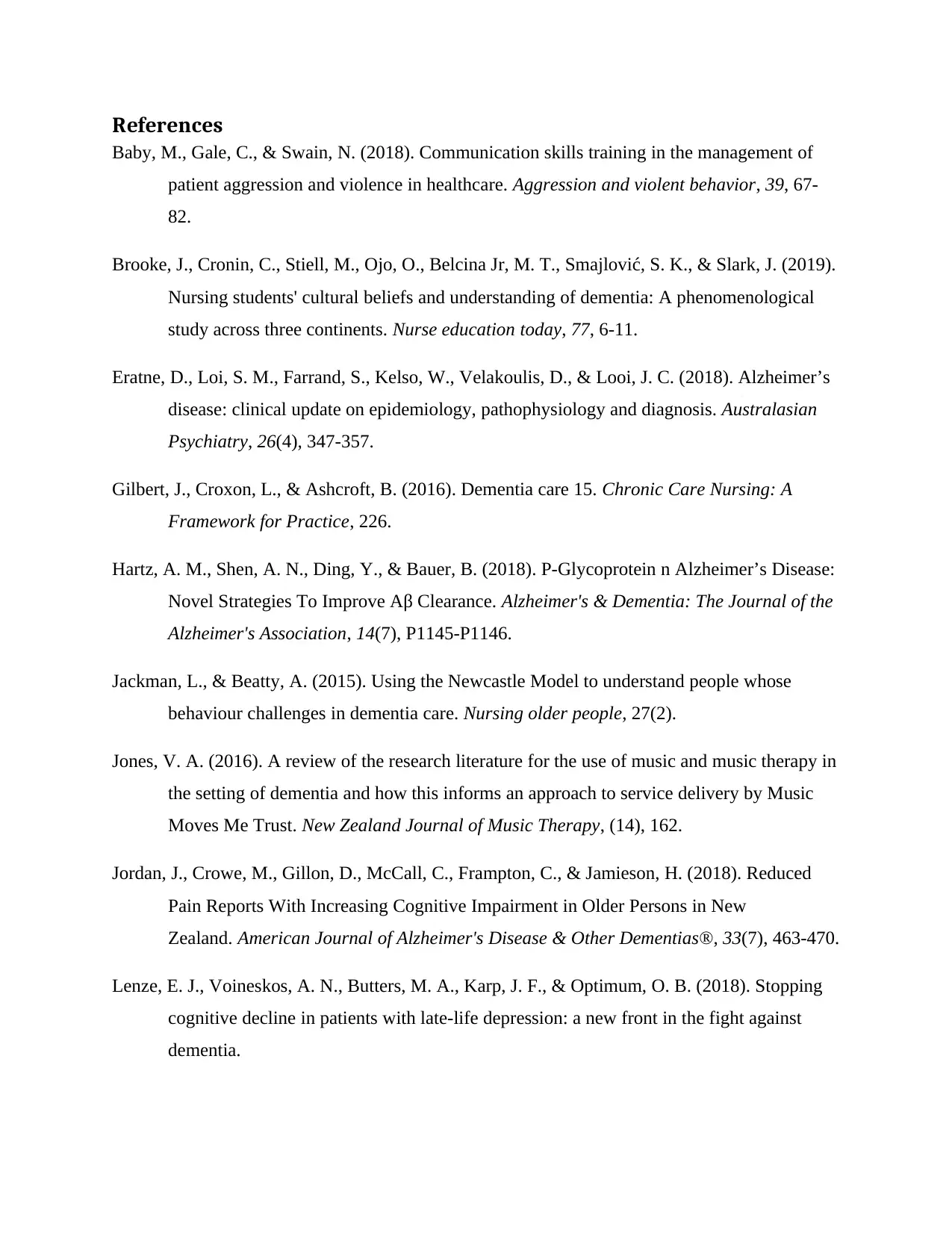
References
Baby, M., Gale, C., & Swain, N. (2018). Communication skills training in the management of
patient aggression and violence in healthcare. Aggression and violent behavior, 39, 67-
82.
Brooke, J., Cronin, C., Stiell, M., Ojo, O., Belcina Jr, M. T., Smajlović, S. K., & Slark, J. (2019).
Nursing students' cultural beliefs and understanding of dementia: A phenomenological
study across three continents. Nurse education today, 77, 6-11.
Eratne, D., Loi, S. M., Farrand, S., Kelso, W., Velakoulis, D., & Looi, J. C. (2018). Alzheimer’s
disease: clinical update on epidemiology, pathophysiology and diagnosis. Australasian
Psychiatry, 26(4), 347-357.
Gilbert, J., Croxon, L., & Ashcroft, B. (2016). Dementia care 15. Chronic Care Nursing: A
Framework for Practice, 226.
Hartz, A. M., Shen, A. N., Ding, Y., & Bauer, B. (2018). P-Glycoprotein n Alzheimer’s Disease:
Novel Strategies To Improve Aβ Clearance. Alzheimer's & Dementia: The Journal of the
Alzheimer's Association, 14(7), P1145-P1146.
Jackman, L., & Beatty, A. (2015). Using the Newcastle Model to understand people whose
behaviour challenges in dementia care. Nursing older people, 27(2).
Jones, V. A. (2016). A review of the research literature for the use of music and music therapy in
the setting of dementia and how this informs an approach to service delivery by Music
Moves Me Trust. New Zealand Journal of Music Therapy, (14), 162.
Jordan, J., Crowe, M., Gillon, D., McCall, C., Frampton, C., & Jamieson, H. (2018). Reduced
Pain Reports With Increasing Cognitive Impairment in Older Persons in New
Zealand. American Journal of Alzheimer's Disease & Other Dementias®, 33(7), 463-470.
Lenze, E. J., Voineskos, A. N., Butters, M. A., Karp, J. F., & Optimum, O. B. (2018). Stopping
cognitive decline in patients with late-life depression: a new front in the fight against
dementia.
Baby, M., Gale, C., & Swain, N. (2018). Communication skills training in the management of
patient aggression and violence in healthcare. Aggression and violent behavior, 39, 67-
82.
Brooke, J., Cronin, C., Stiell, M., Ojo, O., Belcina Jr, M. T., Smajlović, S. K., & Slark, J. (2019).
Nursing students' cultural beliefs and understanding of dementia: A phenomenological
study across three continents. Nurse education today, 77, 6-11.
Eratne, D., Loi, S. M., Farrand, S., Kelso, W., Velakoulis, D., & Looi, J. C. (2018). Alzheimer’s
disease: clinical update on epidemiology, pathophysiology and diagnosis. Australasian
Psychiatry, 26(4), 347-357.
Gilbert, J., Croxon, L., & Ashcroft, B. (2016). Dementia care 15. Chronic Care Nursing: A
Framework for Practice, 226.
Hartz, A. M., Shen, A. N., Ding, Y., & Bauer, B. (2018). P-Glycoprotein n Alzheimer’s Disease:
Novel Strategies To Improve Aβ Clearance. Alzheimer's & Dementia: The Journal of the
Alzheimer's Association, 14(7), P1145-P1146.
Jackman, L., & Beatty, A. (2015). Using the Newcastle Model to understand people whose
behaviour challenges in dementia care. Nursing older people, 27(2).
Jones, V. A. (2016). A review of the research literature for the use of music and music therapy in
the setting of dementia and how this informs an approach to service delivery by Music
Moves Me Trust. New Zealand Journal of Music Therapy, (14), 162.
Jordan, J., Crowe, M., Gillon, D., McCall, C., Frampton, C., & Jamieson, H. (2018). Reduced
Pain Reports With Increasing Cognitive Impairment in Older Persons in New
Zealand. American Journal of Alzheimer's Disease & Other Dementias®, 33(7), 463-470.
Lenze, E. J., Voineskos, A. N., Butters, M. A., Karp, J. F., & Optimum, O. B. (2018). Stopping
cognitive decline in patients with late-life depression: a new front in the fight against
dementia.
Paraphrase This Document
Need a fresh take? Get an instant paraphrase of this document with our AI Paraphraser
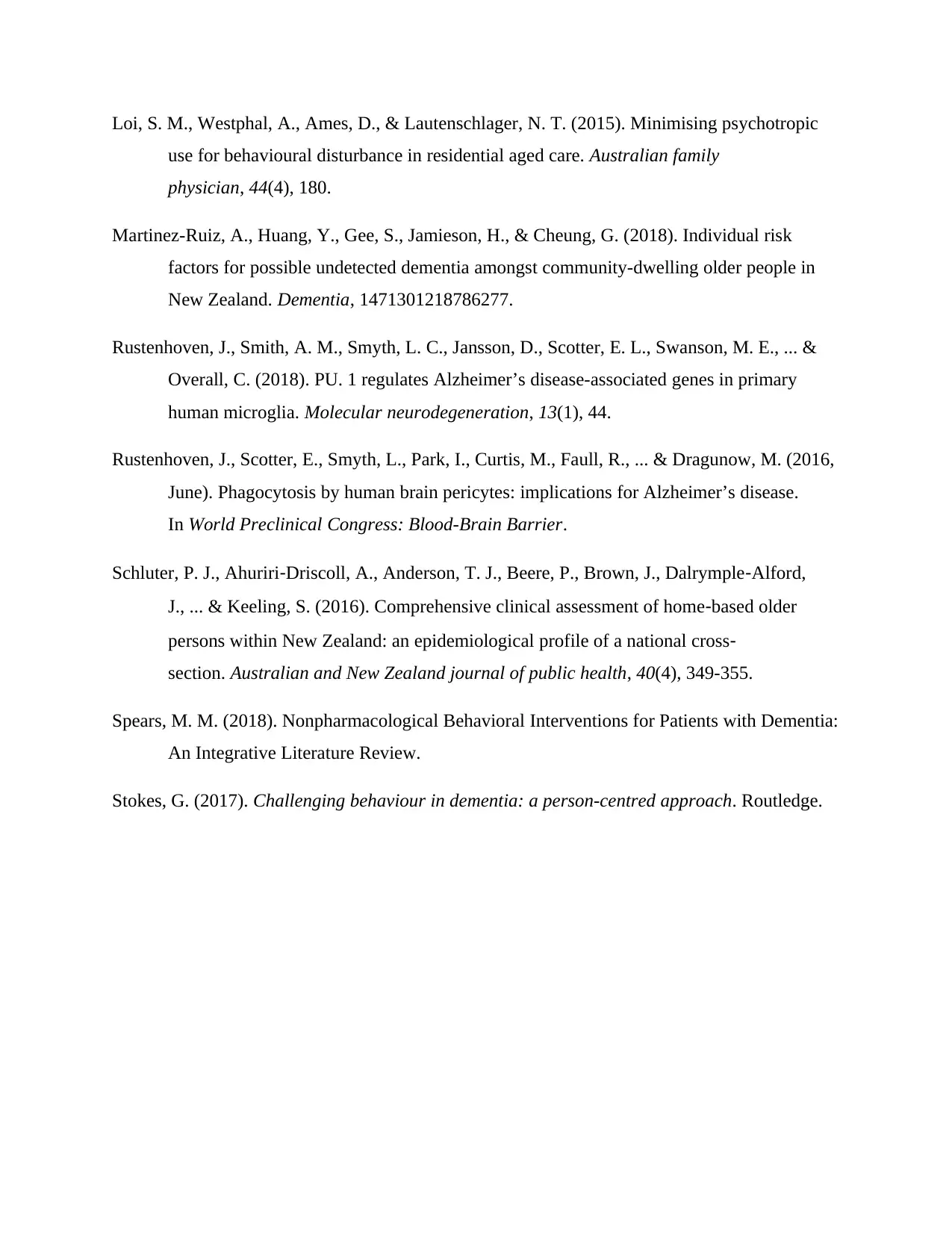
Loi, S. M., Westphal, A., Ames, D., & Lautenschlager, N. T. (2015). Minimising psychotropic
use for behavioural disturbance in residential aged care. Australian family
physician, 44(4), 180.
Martinez-Ruiz, A., Huang, Y., Gee, S., Jamieson, H., & Cheung, G. (2018). Individual risk
factors for possible undetected dementia amongst community-dwelling older people in
New Zealand. Dementia, 1471301218786277.
Rustenhoven, J., Smith, A. M., Smyth, L. C., Jansson, D., Scotter, E. L., Swanson, M. E., ... &
Overall, C. (2018). PU. 1 regulates Alzheimer’s disease-associated genes in primary
human microglia. Molecular neurodegeneration, 13(1), 44.
Rustenhoven, J., Scotter, E., Smyth, L., Park, I., Curtis, M., Faull, R., ... & Dragunow, M. (2016,
June). Phagocytosis by human brain pericytes: implications for Alzheimer’s disease.
In World Preclinical Congress: Blood-Brain Barrier.
Schluter, P. J., Ahuriri‐Driscoll, A., Anderson, T. J., Beere, P., Brown, J., Dalrymple‐Alford,
J., ... & Keeling, S. (2016). Comprehensive clinical assessment of home‐based older
persons within New Zealand: an epidemiological profile of a national cross‐
section. Australian and New Zealand journal of public health, 40(4), 349-355.
Spears, M. M. (2018). Nonpharmacological Behavioral Interventions for Patients with Dementia:
An Integrative Literature Review.
Stokes, G. (2017). Challenging behaviour in dementia: a person-centred approach. Routledge.
use for behavioural disturbance in residential aged care. Australian family
physician, 44(4), 180.
Martinez-Ruiz, A., Huang, Y., Gee, S., Jamieson, H., & Cheung, G. (2018). Individual risk
factors for possible undetected dementia amongst community-dwelling older people in
New Zealand. Dementia, 1471301218786277.
Rustenhoven, J., Smith, A. M., Smyth, L. C., Jansson, D., Scotter, E. L., Swanson, M. E., ... &
Overall, C. (2018). PU. 1 regulates Alzheimer’s disease-associated genes in primary
human microglia. Molecular neurodegeneration, 13(1), 44.
Rustenhoven, J., Scotter, E., Smyth, L., Park, I., Curtis, M., Faull, R., ... & Dragunow, M. (2016,
June). Phagocytosis by human brain pericytes: implications for Alzheimer’s disease.
In World Preclinical Congress: Blood-Brain Barrier.
Schluter, P. J., Ahuriri‐Driscoll, A., Anderson, T. J., Beere, P., Brown, J., Dalrymple‐Alford,
J., ... & Keeling, S. (2016). Comprehensive clinical assessment of home‐based older
persons within New Zealand: an epidemiological profile of a national cross‐
section. Australian and New Zealand journal of public health, 40(4), 349-355.
Spears, M. M. (2018). Nonpharmacological Behavioral Interventions for Patients with Dementia:
An Integrative Literature Review.
Stokes, G. (2017). Challenging behaviour in dementia: a person-centred approach. Routledge.
1 out of 8
Related Documents
Your All-in-One AI-Powered Toolkit for Academic Success.
+13062052269
info@desklib.com
Available 24*7 on WhatsApp / Email
![[object Object]](/_next/static/media/star-bottom.7253800d.svg)
Unlock your academic potential
Copyright © 2020–2026 A2Z Services. All Rights Reserved. Developed and managed by ZUCOL.





